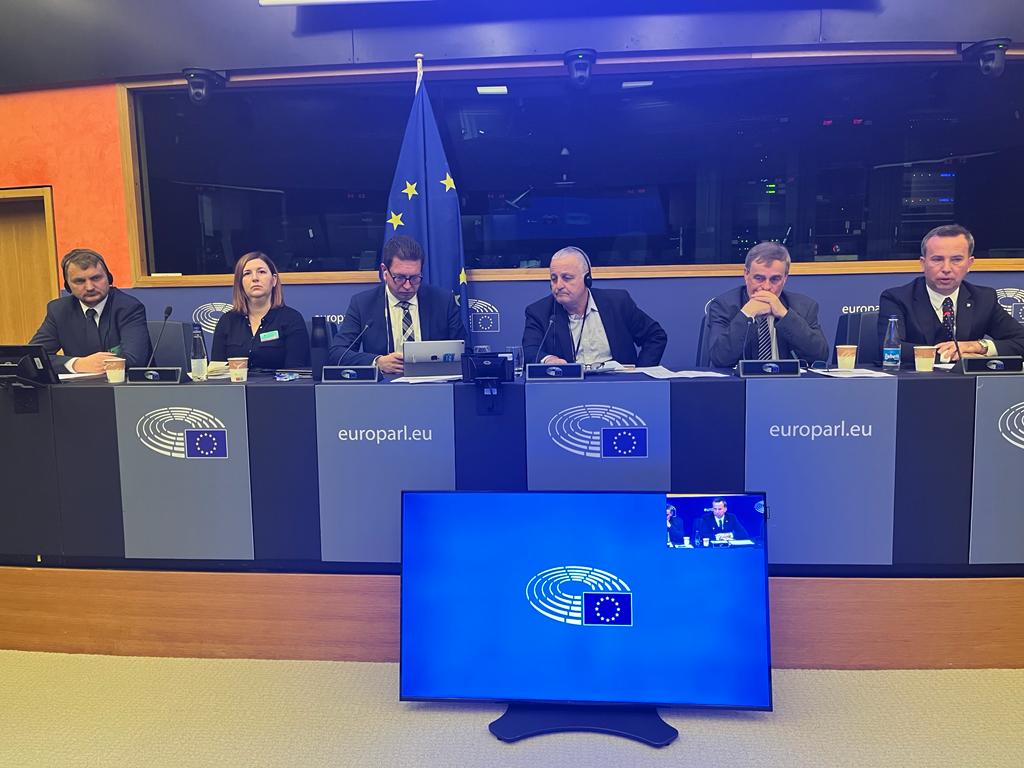
FUEN resolutions and the discrimination of German children in Poland presented to the Minority Intergroup
06.10.2022The FUEN resolutions adopted by the Assembly of Delegates at last week’s congress in Berlin were presented by freshly re-elected FUEN President Loránt Vincze at the meeting of the European Parliament’s Minority Intergroup in Strasbourg on Thursday, 6 October 2022. Mr Vincze, who as an MEP is also co-chair of the Intergroup, also presented the topics and conclusions of the congress of the umbrella organisation, adding that „I hope that FUEN will remain an organisation dealing with minority problems and fighting for minority rights, and I am confident that we will be successful in adding more and more tools for the protection of national minorities and language groups in Europe”.
At the invitation of the Intergroup, Bernard Gaida, Speaker of the German Working Group (AGDM) and new Vice-President of FUEN and Rafał Bartek, President of the Association of the German Social Cultural Societies in Poland (VdG) presented the challenges the German minority is facing in Poland since the teaching of German as a minority language was reduced from three to one hour per week by the decree of the Ministry of Education and Science on 4 February 2022. The ministerial decree introduces restrictions on the use of a minority language and reduction in subsidy that apply only to one of the nine national minorities, namely the German minority living in Poland, therefore questions the respect of national and international legal and human rights standards.
Mr. Gaida said that currently any dialogue with the Polish government is out of question as they are ignoring them. He related that out of solidarity, 14 out of 20 minority representatives have suspended their activity in the government body National Committee of Nationalities, but even that did not get any reaction from the government.
Mr. Bartek detailed the numerous actions the German minority undertook to solve the situation, including contacting European institutions, but, as he said, “Europe doesn’t seem to care at all, even though we are talking about 50,000 children that are now second-class citizens.” In his view, the European Commission’s reasoning that this is an edcuation issue, which is the competence of member states, does not stand, as this should not be a debate on education policies, but on human rights and discrimination. As a consequence of this decision, German schools receive less funding, which could endanger the existence of small village schools; 500 German teachers might lose their jobs; it could lead to a lack of German-speaking personnel, it deteriorates the Polish-German economic and political relations, but first and foremost the children have to suffer.
The Intergroup’s members have agreed on writing a letter to the Commission and the President of the European Parliament and advised the community leaders to hand in a petition on this issue to the Petitions Committee of the Parliament.
COMMUNIQUÉ DE PRESSE
- FUEN wishes you a peaceful Christmas season, restful days and a bright, hopeful start to the new year!
- FUEN calls on the EU to act over systematic ethnic-based land confiscations in Slovakia
- Women of Minorities conference in Budapest calls for structural change to ensure equal political participation of minority women
- FUEN President Olivia Schubert at UN Forum on Minority Issues in Geneva
- "Laboratory of Peace": 28th Seminar of Slavic Minorities held in European Capital of Culture Gorica/Gorizia
- Equality in Political Participation and Representation: Third “Women of Minorities” Conference to Be Held in Budapest
- FUEN Working Group on Education discusses challenges and future of minority schooling in Europe
- 28th Seminar of Slavic Minorities in Europe to take place in Gorica/Gorizia, Italy
- Olivia Schubert in her first interview as FUEN President
- FUEN Assembly of Delegates elects new leadership – Olivia Schubert becomes new President














